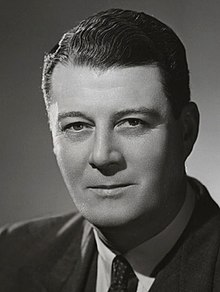Alfred Broughton
This article needs additional citations for verification. (November 2021) |
Sir Alfred Broughton | |
|---|---|
 Photograph by Bassano Ltd, 1950 | |
| Member of Parliament for Batley and Morley | |
| In office 18 February 1949 – 2 April 1979 | |
| Preceded by | Hubert Beaumont |
| Succeeded by | Kenneth Woolmer |
| Personal details | |
| Born | 18 October 1902 |
| Died | 2 April 1979 (aged 76) |
| Political party | Labour |
Sir Alfred Davies Devonsher Broughton (18 October 1902 – 2 April 1979) was a British Labour Party politician.
Early life
Broughton was educated at Rossall School, Downing College, Cambridge and the London Hospital and became a doctor, a member of a family who had been Batley doctors for 70 years. During World War II he worked in civil defence and in the medical branch of the Royal Air Force. He was a member of Batley Borough Council 1946–49.
Parliamentary career
Broughton was Member of Parliament for Batley and Morley from a 1949 by-election. He was an opposition whip in 1960. Broughton was in poor health throughout the 1970s, spending much of the time living in hospital in Yorkshire. The fact that the Labour government's majority had been lost meant that his treatment was often disrupted so that he could be taken down to London to be 'nodded through' to win key votes.
1979 no confidence vote and death
On 28 March 1979 the government faced a knife-edge vote of no confidence when Broughton was on his death bed. Broughton's doctors were extremely concerned for him and strongly advised him not to travel. Although he was willing to come down to vote knowing that death was imminent, Prime Minister James Callaghan decided it would be unacceptable to ask him to do so, in case he died during the ambulance journey. In the event, the government lost by one vote; had Broughton been present, assuming Speaker George Thomas would have broken the tie in favour of the status quo per Speaker Denison's rule, the Government would have survived. Broughton died five days later, aged 76.[1]
In popular culture
On 8 June 2009 an afternoon play called How Are You Feeling, Alf? about Broughton and the 1979 no confidence vote was aired on BBC Radio 4. It was written by James Graham and featured David Ryall as Broughton and Malcolm Tierney as James Callaghan.[2] Three years later, Graham wrote This House, first staged by the National Theatre, which expanded on the political situation in the 1970s, in which Broughton is a key character.
References
- ^ Hattersley, Roy (22 March 2009). "The party's over". The Guardian. Retrieved 30 May 2022.
- ^ "BBC Radio 4 - Drama, How Are You Feeling, Alf?".
External links
- Hansard 1803–2005: contributions in Parliament by Alfred Broughton
- Times Guide to the House of Commons October 1974
- Leigh Rayment's Historical List of MPs
- 1902 births
- 1979 deaths
- Labour Party (UK) MPs for English constituencies
- Councillors in West Yorkshire
- UK MPs 1945–1950
- UK MPs 1950–1951
- UK MPs 1951–1955
- UK MPs 1955–1959
- UK MPs 1959–1964
- UK MPs 1964–1966
- UK MPs 1966–1970
- UK MPs 1970–1974
- UK MPs 1974
- UK MPs 1974–1979
- People educated at Rossall School
- Alumni of Downing College, Cambridge
- Royal Air Force personnel of World War II
- Knights Bachelor
- Politicians awarded knighthoods
- Civil Defence Service personnel
- Labour MP for England stubs
